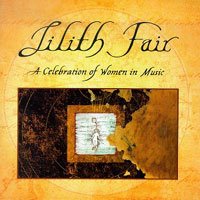Whither the Lilith Ladies?

Don't get me wrong, I never expected Jill Sobule to have a major career. Or Heather Nova or Merril Bainbridge or Abra Moore or any of the other minor female talents who poked out their heads between 1995 and 1999. That was a time I call the "Lilith Era," when female singer-songwriters were experiencing a level of popularity not known since the mid-1970s heyday of Carole King, Carly Simon, and a newly resurgent Joni Mitchell.
I did, however, expect major things from a few of the Lilith Fair superstars.
Though its first major trek wasn't until 1997, The Lilith Fair epitomizes this period of music history. For three summers, it toured the country with a rotating line-up of nothing but female performers. Every date featured five mainstage acts and plenty more on smaller stages, and ticket sales were alway strong. Remember when all your friends were suddenly wearing sandals made out of hemp or skirts sewn from that crinkly, could-go-up-in-flames-at-any-minute fabric? They were all dressing to go to the Lilith Fair.
And though later summers featured hip-hop, jazz, and country acts, the festival was largely known as a platform for folkie pop-rockers. When I went to the Nashville show in 1997, for instance, I saw Indigo Girls (my then faves), Emmylou Harris, Lisa Loeb, Jewel, and tour founder Sarah McLachlan. The first three were already established, but the last two had risen to fame during the Lilith Era.
What seemed obvious to me at the time was that McLachlan especially had made it to the big time. Not only was this huge musical event her brainchild, but its first summer also dovetailed with her new album "Surfacing," which became her first blockbuster and yielded two top-ten hits in "Adia" and "Angel."
 I figured Sarah McLachlan was going to be an evergreen superstar, much like Alanis Morrisette, who kind of kicked off this whole era with the success of "Jagged Little Pill," and Jewel, whose music I loathed but assumed would be unavoidable for the rest of time. (Honestly, is there any song worse than "Hands?" Okay, maybe "You Were Meant For Me," but you get my point.)
I figured Sarah McLachlan was going to be an evergreen superstar, much like Alanis Morrisette, who kind of kicked off this whole era with the success of "Jagged Little Pill," and Jewel, whose music I loathed but assumed would be unavoidable for the rest of time. (Honestly, is there any song worse than "Hands?" Okay, maybe "You Were Meant For Me," but you get my point.)But you know what? I was wrong. On all counts. Not a single artist who came to prominence during the Lilith Era has maintained a high-profile career.
Sure, McLachlan and Jewel may still move copies of their new records, but after a few weeks, they tend to slip from view. Did you even know that Jewel released her latest album "Goodbye Alice in Wonderland" just a few weeks ago? Most people didn't.
Alanis Morrisette, meanwhile, has been reduced to remaking her one hit album and calling it "Jagged Little Pill Acoustic." That's a sign of desperaton, folks, not of thriving artistry.
Nor is it a good sign that Paula Cole--golden girl of 1997, wondering where all the cowboys had gone--just had an erroneously plural "Greatest Hits" album dumped quietly into stores. Or that Shawn Colvin--who rode "Sunny Came Home" to platinum status after years of releasing beloved indie folk albums--had to issue a press release saying she wasn't retired.
Despite how it may sound, I am not making value judgments against any of these artists. Being popular doesn't make you good, and I still love my copies of "This Fire," "Steady On," and "Fumbling Towards Ecstasy." I'd wager that most of the women mentioned above have made their peace with their fleeting time in the spotlight.
But isn't it weird that not one of them got to stay in the pantheon of fame? Movements in pop music tend to produce scads of temporary stars, most of whom either go on to make interesting, less commercial products or just take up, um, floral design. Usually, though, there's one or two that stick it out. Pearl Jam is still a pretty big deal after grunge. Green Day certainly made it through post-punk. Justin Timberlake and Christina Aguilera both survived late 90s teen pop after Britney and Jessica Simpson traded music for tabloids and the Backstreet Boys got really, really fat.
So why did no one make it out of Lilith?
Do we really have to count Sheryl Crow?
I don't guess it matters, of course. I can hear these women whenever I want, and with the exception of Cole, it doesn't seem any of them are gone for good.
I just figured, given the huge success of the Lilith Era, that it might add up to something more than a passing fad.
Labels: Pop

2 Comments:
Just out of curiosity, why wouldn't Sheryl Crow qualify? Because she's older than the others, or?
But all in all, you have a point. Why didn't any of these "Liliths" have much staying power? I'm going to keep wondering that for the rest of this afternoon...
Truthfully, Sheryl Crow is a bit of a grey area. She's certainly had a lasting career, and she was on the Lilith Fair tour at least once. But I feel like she got popular just before the explosion happened.
I don't know... really, you could go either way, but I still wonder about the others.
Post a Comment
<< Home